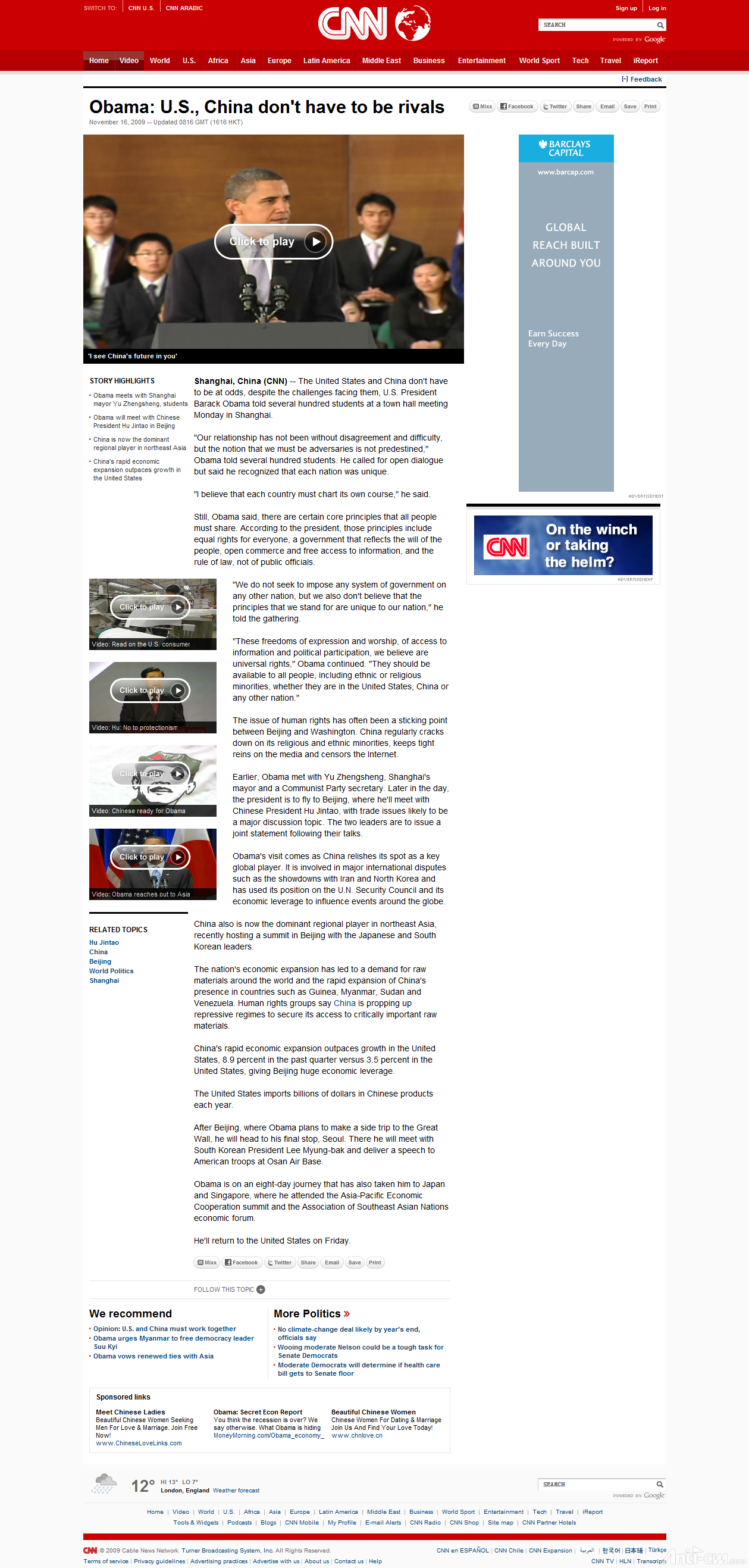|
|
【原文链接】http://edition.cnn.com/2009/POLITICS/11/16/obama.china/index.html
【原文】
Shanghai, China (CNN) -- The United States and China don't have to be at odds, despite the challenges facing them, U.S. President Barack Obama told several hundred students at a town hall meeting Monday in Shanghai.
"Our relationship has not been without disagreement and difficulty, but the notion that we must be adversaries is not predestined," Obama told several hundred students. He called for open dialogue but said he recognized that each nation was unique.
"I believe that each country must chart its own course," he said.
Still, Obama said, there are certain core principles that all people must share. According to the president, those principles include equal rights for everyone, a government that reflects the will of the people, open commerce and free access to information, and the rule of law, not of public officials.
"We do not seek to impose any system of government on any other nation, but we also don't believe that the principles that we stand for are unique to our nation," he told the gathering.
"These freedoms of expression and worship, of access to information and political participation, we believe are universal rights," Obama continued. "They should be available to all people, including ethnic or religious minorities, whether they are in the United States, China or any other nation."
The issue of human rights has often been a sticking point between Beijing and Washington. China regularly cracks down on its religious and ethnic minorities, keeps tight reins on the media and censors the Internet.
Earlier, Obama met with Yu Zhengsheng, Shanghai's mayor and a Communist Party secretary. Later in the day, the president is to fly to Beijing, where he'll meet with Chinese President Hu Jintao, with trade issues likely to be a major discussion topic. The two leaders are to issue a joint statement following their talks.
Obama's visit comes as China relishes its spot as a key global player. It is involved in major international disputes such as the showdowns with Iran and North Korea and has used its position on the U.N. Security Council and its economic leverage to influence events around the globe.
China also is now the dominant regional player in northeast Asia, recently hosting a summit in Beijing with the Japanese and South Korean leaders.
The nation's economic expansion has led to a demand for raw materials around the world and the rapid expansion of China's presence in countries such as Guinea, Myanmar, Sudan and Venezuela. Human rights groups say China is propping up repressive regimes to secure its access to critically important raw materials.
China's rapid economic expansion outpaces growth in the United States, 8.9 percent in the past quarter versus 3.5 percent in the United States, giving Beijing huge economic leverage.
The United States imports billions of dollars in Chinese products each year.
After Beijing, where Obama plans to make a side trip to the Great Wall, he will head to his final stop, Seoul. There he will meet with South Korean President Lee Myung-bak and deliver a speech to American troops at Osan Air Base.
Obama is on an eight-day journey that has also taken him to Japan and Singapore, where he attended the Asia-Pacific Economic Cooperation summit and the Association of Southeast Asian Nations economic forum.
He'll return to the United States on Friday.

|
China, CNN, don, Obama, rivals, China, CNN, don, Obama, rivals, China, CNN, don, Obama, rivals
评分
-
1
查看全部评分
-
|